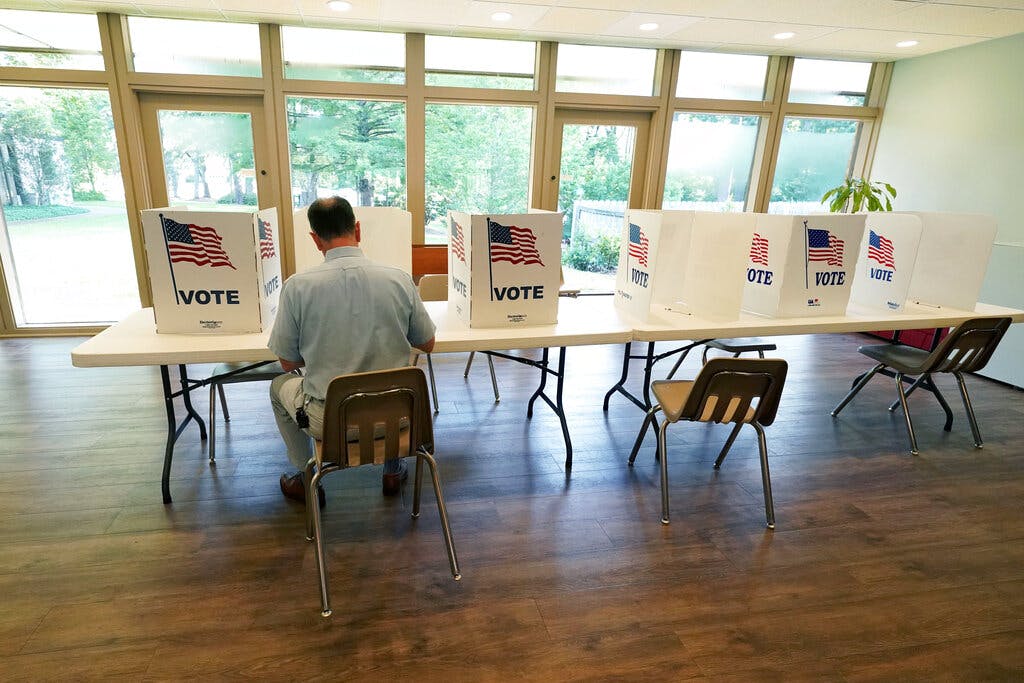Analysts See Potential Boomerang Lurking in Efforts To Reform Electoral Count Act
Reforming the electoral count act without requiring states to respect the democratic outcome of the vote in their state could be ‘dangerous for democracy,’ some legal sages argue.

Legal scholars are warning that changes to the presidential election procedure now being considered by the Senate under the guise of reforming the Electoral Count Act could inadvertently open the door to the sort of meddling that those changes are intended to prevent.
A theory once considered fringe that President Trump’s supporters leaned on as they set out to overturn the 2020 elections — and that is endorsed by at least three sitting Supreme Court justices — argues that states have unilateral control over how they choose the electors that technically vote for presidents under America’s electoral system. Hence, its name: the independent state legislature theory.
The Senate Rules Committee this week concluded the first of several hearings on reforming the Electoral Count Act. Some changes are widely expected to be adopted in the coming months.
Among the proposals are measures to prevent lawmakers and the vice president from challenging a state’s electoral votes. These ideas have raised some red flags among lawyers, who are concerned it could embolden state legislators who dislike the results of the popular vote and give them cover for ignoring the will of the people.
The legal basis to do so would be the independent state legislature theory, which would give state legislators unprecedented discretion in appointing presidential electors.
The theory is a relatively obscure reading of Article II of the Constitution, which says: “Each State shall appoint, in such Manner as the Legislature thereof may direct, a Number of Electors.”
This section of Article II, the argument goes, gives state legislatures the power to determine exactly how those electors are chosen — even if it is undemocratically.
Two Brennan Center analysts, Ethan Herenstein and Thomas Wolf, argue that state legislators could “invoke the theory as a pretext to refuse to certify the results of a presidential election and instead select its own slate of electors.”
A case before the Supreme Court this fall, Moore v. Harper, addresses some of the questions raised by the theory.
Legal scholars are warning that if the proposed changes to the Electoral Count Act are made and this theory is affirmed by the Supreme Court, state legislatures could override the democratic result of a presidential election, and Congress and the vice president would be explicitly prevented from intervening.
In a report on reforming the Electoral Count Act, the New York City Bar argues that “any proposed ECA reform legislation should include a provision making clear that a state legislature may not substitute its judgment for that of the state’s electorate.”
Members of the bar contend that this must be done in order to “avert attempts by state legislators or officials to overturn the results of the popular vote in a state’s presidential election.”
An organization that advocates for reform to the Electoral Count Act, Protect Democracy, says the theory could have “disruptive and harmful effects on the administration of elections, leading to two different and potentially conflicting sets of rules for federal and state elections simultaneously.”
The Senate Rules Committee is apparently aware of concerns about the independent state legislature theory. Senator King raised them in Wednesday’s hearings, though a legal expert testifying at the hearing, Robert Bauer, dismissed them.
Mr. Bauer testified that he did not see the theory as a reason for concern because state legislators must still abide by the “due process and equal protection clauses” of the Constitution and ensure their citizens’ right to vote and that the vote will be recognized.
He argues that “there are constraints” that would prevent states from subverting their state’s popular vote even under the “most extreme” interpretation of independent state legislature theory.
There are still those who argue for including in any changes to the Electoral Count Act a requirement that states respect the popular vote when choosing electors. Among them is the vice president of the New York County Lawyers Association, Richard Swanson.
Mr. Swanson said that because the proposed “amendments are designed to make the counting process in Congress more mechanical,” the reforms could “allow for state legislatures to do whatever they want.”
Reforming the electoral count act without requiring states to respect the democratic outcome of the vote in their state could be “dangerous for democracy,” he said.
“I could support the bill if it added a provision that said each state is required to follow its popular vote in designating electors,” he tells the Sun.

